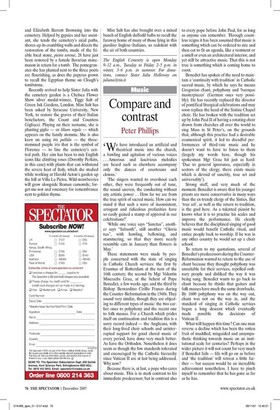Compare and contrast
Peter Phillips G We have introduced an artificial and theatrical music into the church, a bawling and agitation of various voices ... Amorous and lascivious melodies are heard such as elsewhere accompany only the dances of courtesans and clowns.'
'The singers wanted to overshout each other, they were frequently out of tune, the sound uneven, the conducting without any artistic power. ... How far we are from the true spirit of sacred music. How can we stand it that such a wave of inconsistent, arrogant and ridiculous profanities have so easily gained a stamp of approval in our celebrations?'
'While one voice says "Sanctus", another says "Sabaoth", still another "Gloria tua", with howling, bellowing, and stammering, so that they more nearly resemble cats in January than flowers in May.'
These statements were made by people concerned with the state of singing in Catholic Church services: the first by Erasmus of Rotterdam at the turn of the 16th century; the second by Mgr Valentin Miserachs Grau, at the behest of Pope Benedict, a few weeks ago; and the third by Bishop Bernardino Cirillo Franco during the Counter-Reformation in the 1560s. They sound very similar, though they are objecting to different types of music: the two earlier ones to polyphony and the recent one to folk masses. For a Church which prides itself on continuation and tradition this is a sorry record indeed — the Anglicans, with their long-lived choir schools and uninterrupted support for good choral music of every period, have done very much better. As have the Orthodox. Nonetheless it does seem as though the low standards tolerated and encouraged by the Catholic hierarchy since Vatican II are at last being addressed. Why now?
Because there is, at last, a pope who cares about music. This is in stark contrast to his immediate predecessor; but in contrast also to every pope before John Paul, for as long as anyone can remember. Through countless reigns it has been assumed that music is something which can be ordered to size and then cut to fit an agenda, like a vestment or a smell or even an architectural interior, and yet still be attractive music. That this is not true is something which is coming home to roost.
Benedict has spoken of the need to maintain a 'continuity with tradition' in Catholic sacred music, by which he says he means Gregorian chant, polyphony and 'baroque masterpieces' (German ones very possibly). He has recently replaced the director of pontifical liturgical celebrations and may soon replace the head of the Sistine Chapel choir. He has broken with the tradition set up by John Paul II of having a rotating choir drawn from churches all over the world to sing Mass in St Peter's, on the grounds that, although this practice had a desirable ecumenical spirit, it led to dreadful performances of third-rate music and he doesn't want to have to listen to them (largely my words here, though his spokesman Mgr Grau hit just as hard: 'Due to general ignorance, especially in sectors of the clergy, there exists music which is devoid of sanctity, true art and universality').
Strong stuff, and very much of the moment. Benedict is aware that his younger priests are more conservative in many ways than the ex-trendy clergy of the Sixties. But 'true art', as well as the return to tradition, is the goal here. As a talented pianist he knows what it is to practise his scales and improve the performance. He clearly believes that the disciplined singing of good music would benefit Catholic ritual, and entice people back to worship. If he was in any other country he would set up a choir school.
To return to my quotations, several of Benedict's predecessors during the CounterReformation wanted to return to the use of chant because they thought polyphony was unsuitable for their services, repelled ordinary people and disliked the way it was being sung. Benedict wants to go back to chant because he thinks that guitars and folk masses have much the same drawbacks. By 1600 polyphony was on the way out, chant was not on the way in, and the standard of singing in Catholic services began a long descent which eventually made possible the decisions of Vatican II.
What will happen this time? Can one man reverse a decline which has been the rotten fruit of muddled, misguided and unsympathetic thinking towards music on an institutional scale for centuries? Perhaps in the wider picture it will not count for very much if Benedict fails — life will go on as before and `the tradition' will retreat a little further — but success would be an incredible achievement nonetheless. I have to pinch myself to remember that he has gone as far as he has.





































































 Previous page
Previous page